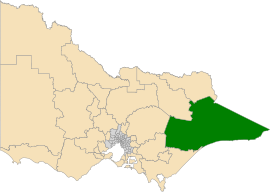Electoral district of Gippsland East
| Gippsland East Victoria—Legislative Assembly | |||||||||||||||
|---|---|---|---|---|---|---|---|---|---|---|---|---|---|---|---|
 Location of Gippsland East (dark green) in Victoria | |||||||||||||||
| State | Victoria | ||||||||||||||
| Created | 1889 | ||||||||||||||
| MP | Tim Bull | ||||||||||||||
| Party | National Party | ||||||||||||||
| Namesake | East Gippsland | ||||||||||||||
| Electors | 46,335 (2018) | ||||||||||||||
| Area | 27,544 km2 (10,634.8 sq mi) | ||||||||||||||
| Demographic | Rural | ||||||||||||||
| |||||||||||||||
The electoral district of Gippsland East is an electoral district of the Victorian Legislative Assembly. It covers most of eastern Victoria and includes the towns of Bairnsdale, Lakes Entrance, Orbost, Omeo, Maffra and Heyfield. Gippsland East is the state's third largest electorate in area and covers 27,544 square kilometres.[1]
The Country Party (now the National Party) held the seat without interruption from 1920 to 1999. However at the 1999 election independent candidate Craig Ingram unexpectedly won the seat after receiving preferences from the independent, One Nation and Labor candidates.[2]
Ingram's victory affected state politics—Ingram and fellow Independents Susan Davies and Russell Savage contributed to the end of the Kennett era by agreeing to back Labor to form government after the 1999 election.[1] Ingram was also returned in the 2002 and 2006 elections. He was defeated in 2010 by National candidate Tim Bull.
Members for Gippsland East
[edit]| Member | Party | Term | |
|---|---|---|---|
| Henry Foster | Unaligned | 1889–1902 | |
| James Cameron | Ministerialist | 1902–1920 | |
| Commonwealth Liberal | |||
| Nationalist | |||
| Sir Albert Lind | Farmers Union | 1920–1961 | |
| Country | |||
| Bruce Evans | Country | 1961–1975 | |
| National Country | 1975–1982 | ||
| National | 1982–1992 | ||
| David Treasure | National | 1992–1999 | |
| Craig Ingram | Independent | 1999–2010 | |
| Tim Bull | National | 2010–present | |
Election results
[edit]| Party | Candidate | Votes | % | ±% | |
|---|---|---|---|---|---|
| National | Tim Bull | 26,737 | 63.3 | +6.6 | |
| Labor | Stephen Richardson | 7,191 | 17.0 | −4.7 | |
| Greens | Nissa Ling | 2,691 | 6.4 | +0.2 | |
| Shooters, Fishers, Farmers | Ricky Muir | 2,460 | 5.8 | +5.8 | |
| Freedom | Ed Barnes | 1,340 | 3.2 | +3.2 | |
| Family First | Carl John Fechner | 1,068 | 2.5 | +2.5 | |
| Animal Justice | Sally Court | 725 | 1.7 | +1.7 | |
| Total formal votes | 42,209 | 95.5 | +1.2 | ||
| Informal votes | 1,995 | 4.5 | −1.2 | ||
| Turnout | 44,204 | 89.0 | +1.3 | ||
| Two-party-preferred result | |||||
| National | Tim Bull | 31,475 | 74.6 | +7.0 | |
| Labor | Stephen Richardson | 10,734 | 25.4 | −7.0 | |
| National hold | Swing | +7.0 | |||
List of towns in Gippsland East
[edit]Bairnsdale, Boisdale, Briagolong, Bruthen, Buchan, Cann River, Dargo, Ensay, Heyfield, Lakes Entrance, Lindenow, Maffra, Mallacoota, Metung, Newry, Omeo, Orbost, Paynesville, Raymond Island, Stratford, Swan Reach, Swifts Creek and Wy Yung.[2]
References
[edit]- ^ a b "Gippsland East". Victoria Votes. Retrieved 15 February 2015.
- ^ a b "Gippsland East District profile". Victorian Electoral Commission. Archived from the original on 6 October 2009. Retrieved 10 February 2015.
- ^ Green, Antony (11 January 2023). "VIC22 – 2-Party Preferred Results and Swings by District". Antony Green's Election Blog. Retrieved 28 January 2023.
- ^ VIC 2021 Final Redistribution, ABC News. [Retrieved 1 January 2023.
- ^ Gippsland East District results, Victorian Electoral Commission. Retrieved 1 December 2022.
- ^ Full preference distributions – 2022 State election, Victorian Electoral Commission. [Retrieved 17 June 2023.
External links
[edit]
